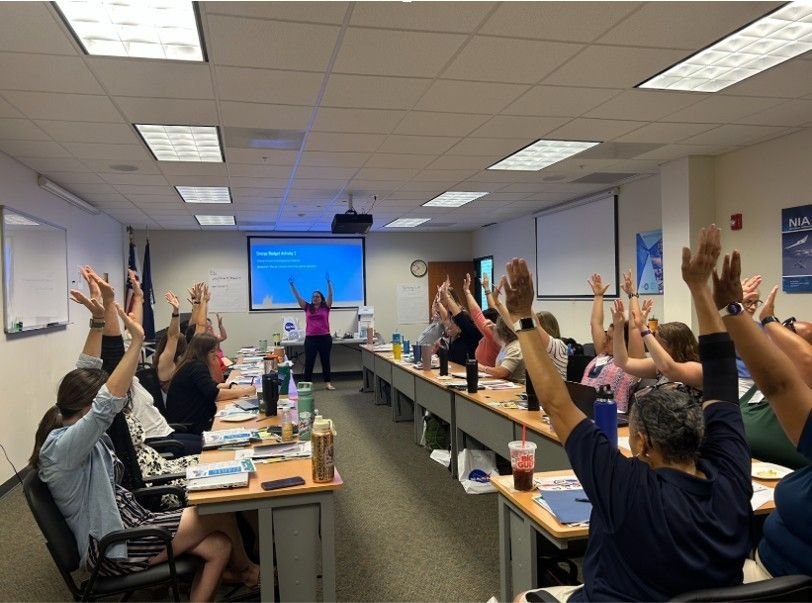Professional learning experiences are integral to the enhancement of classroom instruction. Teachers, at the forefront of Science, Technology, Engineering, & Mathematics (STEM) education, play a key role in the advancement of STEM learning ecosystems and citizen science.
On June 24-25, 2025 – despite a major east coast heat wave – twenty-four educators from eight school districts in the Hampton Roads region of southeastern Virginia (Newport News, Hampton City, Virginia Beach City, Isle of Wight County, Poquoson City, Norfolk, York County, and Suffolk Public Schools) converged at the National Institute of Aerospace (NIA) in Hampton, VA for a professional development workshop led by experts from NASA Langley Research Center and the NASA Science Activation program’s NIA-led NASA eClips team. Developed in collaboration with another NASA Science Activation team, GLOBE (Global Learning and Observations to Benefit the Environment) Mission Earth, and with support from the Coastal Virginia STEM Hub (COVA STEM) – a “STEM learning ecosystem targeting pre-K to adult residents in Coastal Virginia” – this two-day training, also provided comprehensive resources, including lesson plans, pacing guides, classroom activities, and books, all designed for integration into Hampton Roads classrooms.
The NASA Langley team led workshop participants through a training about GLOBE, a program dedicated to advancing Earth System science through data collected by volunteer members of the public, also known as ‘citizen scientists’. GLOBE invites educators, students, and members of the public worldwide (regardless of citizenship) to collect and submit cloud, surface temperature, and land cover observations using the GLOBE Observer app – a real-time data collection tool available right on their smartphones. These observations are then used to help address scientific questions at local, regional, and global scales. Through this training, the educators participated in K-20 classroom-friendly sample lessons, hands-on activities, and exploring the GLOBE Observer app, ultimately qualifying them as GLOBE Certified Educators. Earth System science lessons, activities, and information on how to download the GLOBE Observer citizen science app are available on the GLOBE website. Similarly, NASA eClips, which focuses on increasing STEM literacy in K-12 students, provided educators with free, valuable, standards-based classroom resources such as educator guides, informational videos, engineering design packets, and hands-on activities, which are available to educators and students alike on the NASA eClips’ website. Throughout the training, educators collaborated in grade-level groups, brainstorming new ways to integrate these standards-based NASA science resources.
One educator envisioned incorporating GLOBE’s cloud resources and supportive NASA eClips videos into her energy budget unit. Others explored modifying a heat-lamp experiment to include humidity and heat capacity. One teacher enthusiastically noted in response to a GLOBE urban heat island lesson plan, “The hands-on elements are going to be really great deliverables!” The creative energy and passion for education were palpable.
The dedication of both NIA and NASA Langley to education and local community support was evident. This professional learning experience offered educators immediately-applicable classroom activities and fostered connections among NASA science, NASA eClips, the GLOBE Program, and fellow educators across district lines. One educator highlighted the value of these networking opportunities, stating, “I do love that we’re able to collaborate with our colleagues so we can plan for our future units during the school year”. Another participant commented, “This is a great program…I am going to start embedding [this] in our curriculum.”
GME (supported by NASA under cooperative agreement award number NNX16AC54A) and NASA eClips (supported by NASA under cooperative agreement award number NNX16AB91A) are part of NASA’s Science Activation Portfolio. Learn more about how Science Activation connects NASA science experts, real content, and experiences with community leaders to do science in ways that activate minds and promote deeper understanding of our world and beyond: https://science.nasa.gov/learn


